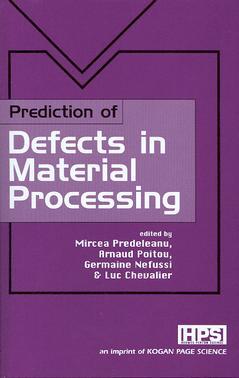Prediction of Defects in Material Processing
Langue : Anglais
Auteurs : PREDELEANU Mircea, POITOU Arnaud, NEFUSSI Germaine, CHEVALIER Luc

This publication focuses on advanced methods for predicting and avoiding the occurrence of defects in manufactured products. It covers the major manufacturing operations, and considers conventional and new materials such as metal alloys, ceramics, composites and polymers. Topics presented include microstructural evolutions during processing induced properties in some materials, damage modelling and fracture criteria, instability analysis, specific methods for the prediction of defects and influence of defects on the integrity of structures. The book also covers a number of research trends that are still being developed, such as the development of micromechanical damage models, micromechanical analysis of fracture mechanisms and criteria, damage modelling of free surface and interface elements, and computer methods for estimation of residual strength of damaged structures or the fatigue limit.
Application of Extended Bernoulli's Theorem to Prediction of Central Bursting Defects in Extrusion and Drawing. Identification of a Continuum Damage Model from Micro-hardness Measurements. Growth and Coalescence of non Spherical Voids in Metals Deformed at Elevated Temperature. Lattice Misorientations in Titanium Alloys. Interaction of Initial and Newly Born Damage in Fatigue Crack Growth and Structural Integrity. A Ductile Damage Model with Inclusion Considerations. Failure Prediction in Anisotropic Sheet Metals under Forming Operations using Damage Theory. Analysis and Experiment on Void Closure Behavior inside the Sheet during Sheet Rolling Processes. Analysis of the Interply Porosities in Thermoplastic Composites Forming Processes. Predicting Material Defects in Reactive Polymeric Flows. Anisotropic Damage for Aluminium. Shape Defects Measurement in 3D Sheet Metal Stamping Processes. Cavity Defects and Failure Study of Ceramic Components. Prediction of Necking Initiation during the Bending of Metal-rubber Profiles by FEM Simulations of the Forming Process. Application of the Variational Self-Consistent Model to the Deformation Textures of Titanium. Influence of Strain-hardening and Damage on the Solid-state Drawing of Poly(oxymethylene). Mathematical Modeling of Dynamic Processes of Irreversible Deforming, Micro- and Macrofracture of Solids and Structures. Numerical Simulation of Ductile Damage in Metal Forming Processes. Part 1. Theoretical and Numerical Aspects. Part 2. Some Applications. A Simplified Model of Residual Stresses Induced by Punching. Wrinkling and Necking Instabilities for Tube Hydroforming. Forming Limit Curves in Blow Molding for a Polymer Exhibiting Deformation Induced Crystallization. Modeling of Thin Sheet Blanking with a Micromechanical Approach. Anisotropy in Thin, Canning Sheet Metals. Progress in Microscopic Modeling of Damage in Steel at High Temperature. Use of Laser-Doppler Velocimetry and Flow Birefringence to Characterize Spurt Flow Instability during Extrusion of Molten HDPE. Induced non Homogeneity in Saturated Granular Media Submitted to Slow Shearing. A Priori Model Reduction Method for Thermo-mechanical Simulations. Fatigue Analysis of Materials and Structures using a Continuum Damage Model. Influence of Initial and Induced Hardening on the Formability in Sheet Metal Forming. Computational Characterization of Micro-to Macroscopic Mechanical Behavior and Damage Polymer Containing Second-Phase Particles.
Date de parution : 12-2003
Ouvrage de 380 p.
16x24 cm
Thèmes de Prediction of Defects in Material Processing :
© 2024 LAVOISIER S.A.S.



